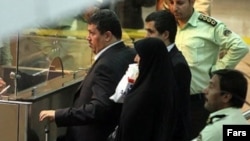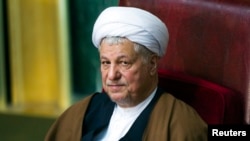In hard-line regimes, punishment can sometimes be dealt out under the guise of sweeping out corruption.
Such appears to be the case in Tehran where the regime has punished the son of a prominent ex-president, who analysts say is being targeted for supporting the political opposition, the Green Movement.
Mehdi Hashemi Rafsanjani, the 45-year-old son of former Iranian President Ayatollah Ali Akbar Hashemi Rafsanjani, faces three prison terms totaling 15 years on corruption charges.
“Yes, it seems very clear that the prosecution of Mehdi Rafsanjani was politically motivated, both to repress the Green Movement, and, as an indirect attack on his father,” Mark Fitzpatrick at the International Institute for Strategic Studies in London told VOA via e-mail.
While Western analysts say there is evidence of corruption in the case, they also say that corruption in Iran is widespread and how punishment is handed out depends on the wishes of the regime.
Selective crackdowns
Crackdowns against illicit activity are selective - largely due to political affiliations, analysts say.
“Corruption is endemic in Iran,” Fitzpatrick said. “It [Iran] ranks in the bottom quarter of Transparency International’s Corruption Perception Index, well below China. And, like China, the anti-corruption campaign is used for political purpose against opponents and rivals.”
Judiciary spokesman Gholamhossein Mohseni Ejie is quoted by state media as saying the son’s convictions are for fraud, embezzlement, and unspecified “national security matters.”
The sentences, announced March 15, come after several years of investigation into the businessman’s activities, which Western reports say included a trail of bribery.
Probes were launched against him in 2012, when he was held for three months before being released, and again in 2014, before the convictions were issued.
Along with getting jail time, Rafsanjani was also fined, ordered to surrender assets to the state, and barred from holding political office.
If these sentences are upheld upon review by a higher court, they would be among the stiffest ever handed to a member of a high-ranking official’s family.
Green Movement
Former President Rafsanjani's family came under regime watch after he endorsed reformist Mir Hossein Mousavi and the “Green Movement” in the 2009 elections. Mousavi lost to President Mahmoud Ahmadinejad and his backers did not regain favor with the regime.
Even though Rafsanjani was one of the founders of the Islamic Republic and served as president from 1989 to 1997, he has apparently lost his status in Tehran, analysts say. His son’s conviction came as the 80-year-old is jockeying to participate in parliamentary elections
And his son’s conviction came as Rafsanjani was defeated this month by hard-liner Ayatollah Mohammad Yazdi in a race to be the chief of the Assembly of Experts - Iran's highest-ranking clerical group.
Still, the son’s business past has been marked by a number of instances of corruption, according to Western reports.
The New York Times reported that a Norwegian court convicted him in 2004 of extracting a $15 million bribe from Norway’s state oil company, Statoil, in return for his securing contracts for developing production at Iran’s South Pars oil patch.
According to documents issued by the World Bank, Statoil paid bribes “to an Iranian government official” identified as Rafsanjani, then a director of the National Iranian Oil Company, through a third-party firm named “Horton Investments,” located in London. Horton was an entity controlled by Rafsanjani, records show.
In 2007, the ex-president’s son came under the scrutiny of French investigators looking into dealings by the petroleum firm Total. At that time, Total CEO Christophe de Margerie was under investigation for alleged bribery connected to a 1997 Iranian gas contract. At that time, de Margerie was Total’s Middle East director.
That investigation found alleged bribes paid by Total to a Swiss bank account controlled by someone connected to Mehdi Rafsanjani. The probe also uncovered a series of alleged bribes paid to Iranian officials between 1996 and 2003.
As a result, a French judge presiding over this corruption investigation banned de Margerie from meeting with Mehdi Rafsanjani and, as well, with his father, Akbar.
History of controversy
The Rafsanjani family, prominent since the 1979 revolution that established the Islamic Republic, has a history of controversy.
“Mehdi’s father is widely thought to have profited excessively from commercial business done in Iran, including by semi-state institutions known as “bonyads,” which is one reason for his nickname of ‘the Shark,’” analyst Richard Dalton at the London-based Chatham House research organization told VOA via e-mail.
Dalton said the anti-corruption drive of current Iranian President Hassan Rouhani, and those of his predecessors, have covered activities ranging from “cronyism in awarding contracts and foreign exchange for imports, through illegal payments to steer business toward favored people and institutions, to turning a semi-blind eye to the massive illegal imports of commodities to avoid paying duties.”
But some analysts say Mehdi Rafsanjani’s legal woes stem not only from corruption, but also, just as importantly, because of his political affiliations.
Iran scholar Alex Vatanka at the Middle East Institute in Washington said it is clear that the legal action against Mehdi Rafsanjani was intended to smear the father and son.
“Why sentence him now?” Vatanka asked. “The timing is so clearly politically motivated. It’s a way of pressing Mehdi’s father,” whom Vantanka says “has become the godfather of the Iranian reformist/moderate faction. … His sentence will hang over the Rafsanjani family as a way of keeping them in line.”









